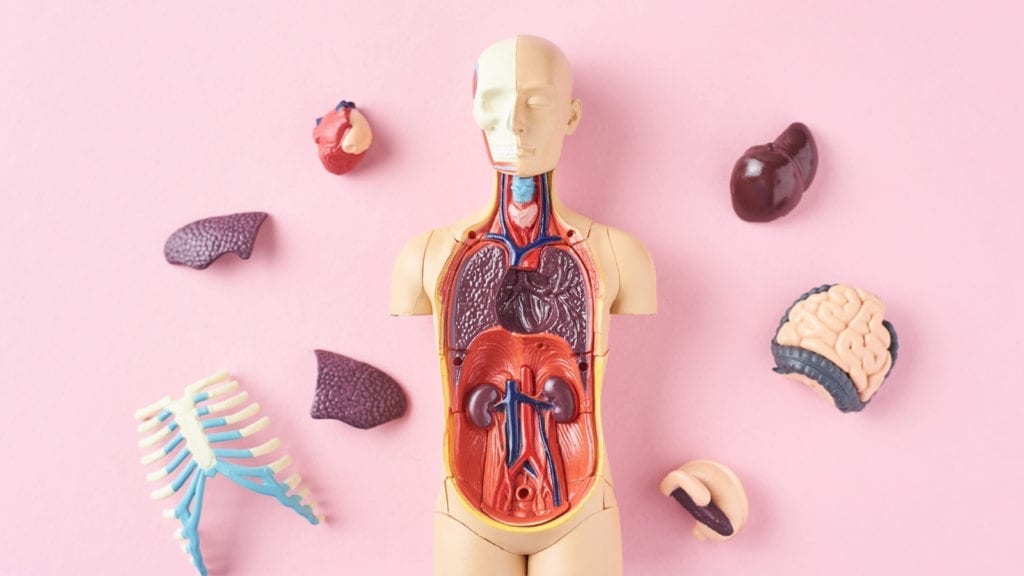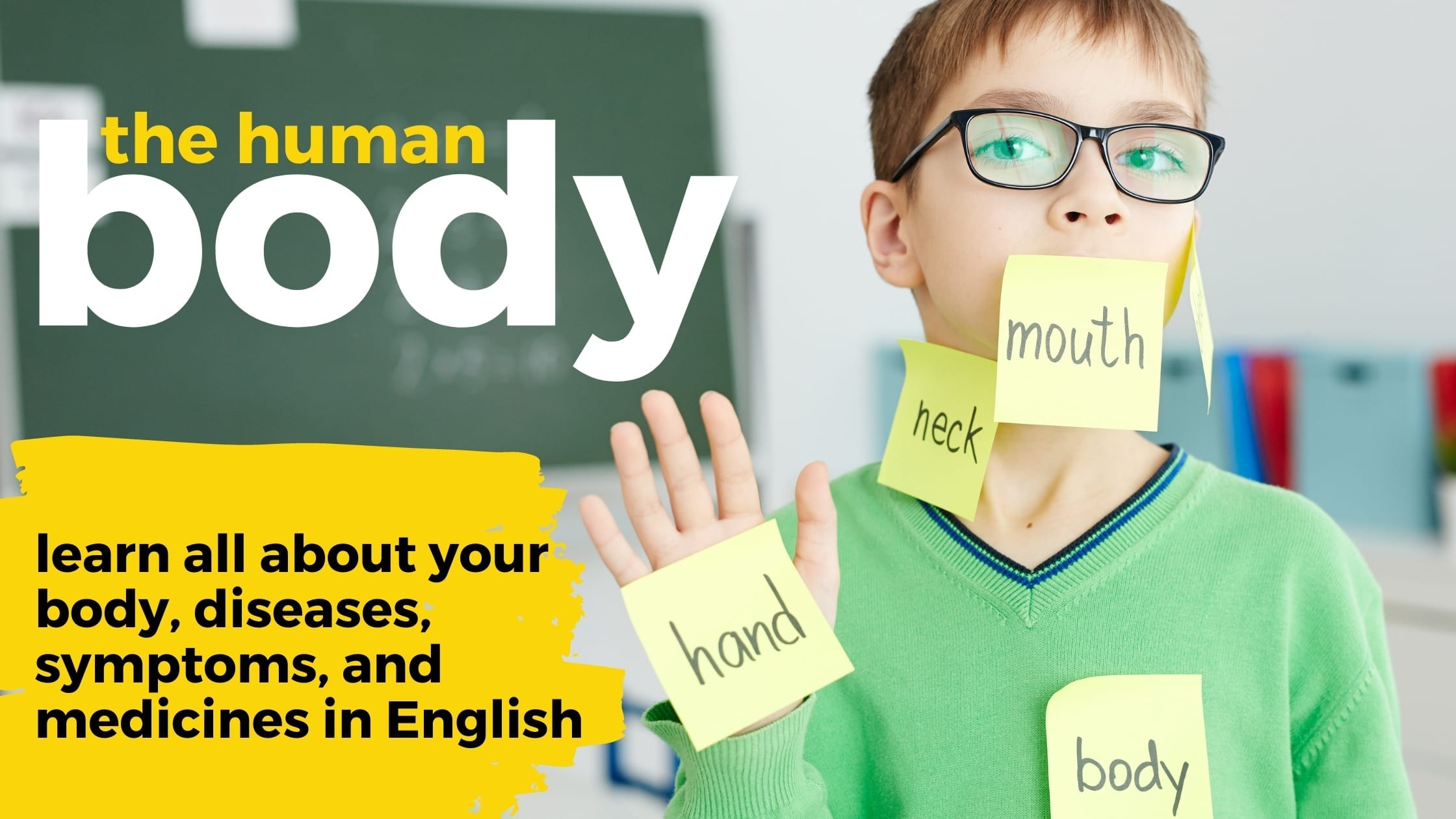The Ultimate English Guide to Body Parts and Health Vocabulary
Even if you have no intention at all of becoming a doctor or nurse, it is extremely important that you learn how to talk about health and body parts in English.
Imagine this situation: you are traveling abroad and suddenly you start feeling sick. You take the medicines you brought with you, but nothing seems to work. What do you do next? You go to the hospital. At the hospital, you will talk to nurses and doctors and they will ask you to describe what you are feeling. I have been to hospitals when traveling abroad and I know how scary it is when you are sick and have no idea how to describe your symptoms.
This guide teaches you about health and body vocabulary in English, the names of common diseases and their symptoms, and a list of idioms that we often use when talking about feeling sick. We will also give you some recommendations of medical TV shows so you can practice your English listening skills by watching a conversation between a doctor and a patient.
Body parts list in English: the front
Take a look at the image below to learn the names of the body parts which compose the front of your body. Then, we have a close-up of the face for you to study more vocabulary about the parts of the body in English. Look at this gallery with human body parts pictures and names.


Close-up: mouth
Let us also talk about the inside of your mouth. You have 32 teeth (plural form). When talking about one of them, you will call it a tooth (singular form). There are 4 different types of teeth: incisors, canines, premolars, and molars.

Among the molars, we have four which we call wisdom teeth. Wisdom teeth are the last to grow and people usually have them removed by the age of 20. It can be very painful if they get infected. After removing them, people often go on a liquid diet for a few days – it is a great excuse to have an insane amount of ice cream!
When we are having our wisdom teeth removed, we can say:
I am having my wisdom teeth out tomorrow.
You taste food with your tongue. And the tissue around the teeth is called gum.
Other words associated with your mouth are dentist, braces, brush (teeth), floss, dental floss, root canal.
Close-up: hands
We have names for each of our fingers. Let’s learn each one of them!

Close-up: feet
It is important to know that we use the word finger to talk about the parts of our hands, but we use the word toe to talk about our feet. The first thing every new parent does is count the fingers and toes of a baby, right? Ten fingers, ten toes.

Parts of the body in English: the back
Take a look at the image below to learn the vocabulary of the body parts which compose the back of the human body.
FYI: There are several names we use to refer to our butt. Butt is the most common one, but you may also hear bottom, buttocks, booty, and bum.

English vocabulary list for internal organs
Most health problems and diseases (you can read more about health and diseases below) start in our internal organs. Since we cannot see these body parts, we take blood tests (also referred to as blood work) or imaging exams so that the doctors can diagnose us with a condition. The names of some imaging exams are: X-ray, computer tomography (CT) scan, magnetic resonance imaging (MRI), and ultrasound.
Some of the internal organs that a doctor will check are listed below.
| appendix | bladder | bone |
| brain | digestive system | gallblader |
| heart | large intestine | liver |
| lungs | skeleton | small intestine |
| spleen | spine | urinary tract |

Vocabulary for health and diseases in English
Let’s learn English vocabulary about the most common diseases we may experience during our lives and review the symptoms that are often associated with each one of them and the medicines we usually take to cure them. Health problems vocabulary can be complex, so if you are an ESL beginner, don’t worry about trying to learn all these words at once.
Disease, illness, or sickness?
First off, it is important for you to know that you may see three words when reading about problems people have with their body: disease, illness, and sickness. Even though they are used interchangeably, there are some differences between them.
Disease is the name a health professional gives to a health condition.
Example: Giving up smoking reduces the risk of heart disease.
Illness is the name people give to what they are feeling. There is a saying (an expression that usually contains some wisdom or advice) that goes like this and may help us understand the difference: a patient goes to the doctor with an illness, and goes home with a disease.
Example: Scientists have not yet found a cure for this illness.
Sickness is how we refer to the social and cultural conceptions of disease. Sick is an adjective we use to say we are not feeling well (similar to ill), but is also used to say we are nauseous (e.g. I get sick during long car rides) or that something is cool (e.g. The concert was sick! You would have loved it!).
Example: Stress is often a factor in the development of long-term sickness.
How to describe health symptoms in English
Here we have some of the most common diseases and their symptoms. It is important to describe symptoms in English so that the doctor can diagnose you.
| Disease | Symptoms |
| Flu | fever, cough, sore throat, runny or stuffy nose, muscle or body aches, headaches, tiredness |
| Stomachache | cramps, constipation, vomiting, fever, loss of appetite |
| Headache (types of headaches: migraines, tension, sinus) | pain on one or both sides of your head, pain that throbs or pulses, sensitivity to light and sounds, nausea, vomiting |
| Earache | pain inside the ear, difficulty hearing, discharge running out the ear, pressure inside the ear, itching around the ear |
| Chickenpox | rashes (red spots), fluid-filled blisters, fever, aches, pains |
Other common, but more serious, diseases are:
- diabetes (type 1 and type 2)
- stroke
- asthma
- heart attack
- hypertension (high blood pressure, often referred to as ‘high BP’)
- AIDS
- cancer
- lower respiratory infections (such as pneumonia, influenza, bronchitis, and tuberculosis)
- Alzheimer’s disease
Medicine vocabulary in English: over the counter and prescription drugs
Medicines are divided into two categories: over-the-counter (OTC) medicines and prescription drugs. OTC medicines are those which we can purchase without a medical prescription. Prescription drugs, on the other hand, require written permission (prescription) from a doctor and should only be used by the person to whom they were prescribed.
Some common OTC medicines are:
- Acetaminophen (brand name: Tylenol)
- Ibuprofen (brand names: Advil, Motrin)
- Antihistamines (brand name: Allegra)
- Aspirin
- Expectorants
- Decongestants

Common English idioms to talk about feeling sick
Do you remember the definition of “idiom”? No? We have got you covered.
Idioms are groups of words. Those groups together mean something different than what those words mean separately. They have a lot to do with the culture of the people who use it and that is why we cannot always translate them. Sometimes, even if we cannot translate it, it is possible to have an equivalence in another language.
For instance, while English speakers say “It is raining cats and dogs!” to say that it is raining a lot, Brazilian Portuguese speakers will say “Está chovendo canivete!”, which literally means “It is raining pocket knives!”. You probably have some equivalent expression to that in your native language, don’t you?
Let us take a look at some idioms that English speakers use to say they are feeling sick or unwell.
| Idiom | Meaning | Example |
| be/feel/look under the weather | feel unwell | Lucy looks under the weather today. |
| be coming down with something | feel like you are starting to become sick | Sorry, I cannot go out tonight. I think I am coming down with something. |
| be out of sorts | be ill or unhappy | I have been out of sorts lately. |
| be sick as a dog | be very sick, especially related to stomach diseases | I was sick as a dog after eating shrimp last night. |
| take a turn for worse | become sicker than you were before | My mom took a turn for worse yesterday and I decided to take her to the hospital. |
Body and health vocabulary practice
There is no better way to learn more about body parts, diseases, and medicines than by watching medical series. They are addicting and you can definitely learn a lot by watching the TV doctors and their intriguing cases. There are countless shows you could watch if you are interested in learning more about this topic, but here are a few recommendations from me – a medical series lover. Check it out!
Grey’s Anatomy: this is the longest medical drama in the history of television. No need to say anything else, right? The show follows Dr. Meredith Grey and her friends since the beginning of their careers as doctors at a hospital in Seattle. There are 16 seasons available and the 17th is coming out this November.
ER: it aired from 1994 to 2009 and tells the story of the emergency room (ER) of a fictional hospital in Chicago. The famous actor George Clooney played Dr. Doug Ross for the first four seasons of the show.
More TV shows about medicine
The Good Doctor: this show follows Dr. Shawn Murphy, a young autistic surgeon from a small city who moves to California to work at a prestigious hospital. There are three seasons for you to watch while the 4th season is in the works.
House, MD: this award-winning show follows Dr. House, a physician who is addicted to painkillers. He is a genius who solves the most difficult cases. Be prepared for a lot of sarcasm! The show ended in 2012 after eight seasons.
If you have any recommendations of medical TV shows, feel free to share them down below in the comments!
Being able to talk about our body parts and health symptoms in English can save your life. Literally, save your life. We hope this vocabulary of body parts in English and explanations about diseases and medicines are useful to you. Now you can book that trip without worrying about getting sick while abroad. Don’t forget to buy good travel health insurance though!

